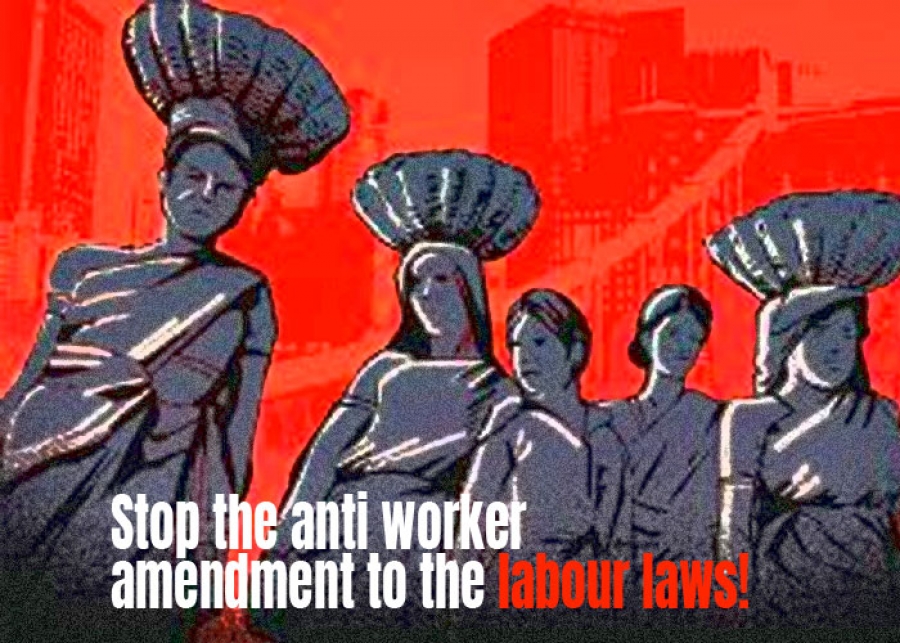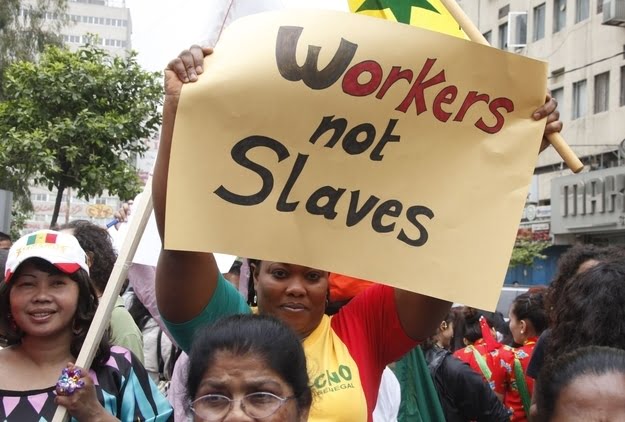More than 50% of India’s population constitutes its labour force. With a country wherein labour participation is this high, worker’s rights and laws for ensuring justice and regulating industries become more important now than ever. Amidst this comes the recent amendment to the Labor Laws in India that have the potential to completely alter worker’s rights in India.
The Narendra Modi government, in the latter half of 2019, announced Four Codes of Labour. In July of last year, the Union Minister of Labour, Santosh Gangwar, introduced the Code of Wages Bill, 2019, marking it as a ‘historic step’ that will improve worker’s conditions. However, this is far from true. This Bill was introduced in replacement of the already existing 44 Labour Laws.
These laws include: Factories Act, 1948; Mines Act, 1952; Dock Workers Act, 1986; Contract Labour Act, 1970; and Inter-State Migrant Workers Act, 1979. It has singlehandedly managed to destroy decades of work that trade unions, human rights organizations, and activists have been doing to ensure worker security and safety. This is the first time in the history of India that these labour laws, crafted carefully after deliberation and discussion with labour unions are being scrapped off in such a haphazard manner.
As per this Amendment, these laws are being replaced by 4 Labour Codes: on Wages, Industrial Relations, Social Security, Occupational Safety, and Health and Working Conditions. There was an attempt to do this even in 2015, which has heavily criticised by the opposition, however, owing to the exceptional majority that the government has in the parliament this term, their will to pass this amendment is stronger than ever.
While the titles of the four codes suggest welfare and safety, the reality of the Bill promises none of it. Through this Bill, the intention of the government is clear, championing industrialists over labour rights, security and safety. The following are some of the key features of the Bill that highlight the extent to which it is discriminatory to the very group that it allegedly wants to protect.

Reduction of Minimum Wage
The Bill introduces Rs. 178 to be the latest standard for minimum floor wage. This low a wage is excellent for inviting investment into the State, but terrible for the labour. Even the government’s own Committee suggested Rs. 375 to be the minimum wage. This wage has rightly been called the ‘starvation wage’ because of the intensity with which it is going to push people into poverty, food insecurity, and malnourishment.
The Bill introduces Rs. 178 to be the latest standard for minimum floor wage. This low a wage is excellent for inviting investment into the State, but terrible for the labour. Even the government’s own Committee suggested Rs. 375 to be the minimum wage.
Exclusion of Workers
Another feature of the Bill is its exclusivity in terms of the kind of labour it includes. It only includes the labour that is registered in the formal sector, completely excluding the informal units and small enterprises of the country, which constitutes more than 95% of the labour force. This is a drastic step against labour rights because it is the people in these informal and small enterprises that are often deprived off of basic rights, amenities, and provisions. By excluding them, the government is pushing a major chunk of its labour into more exploitation.
Also read: Women, Work & Migration: Why Is India’s Female Labour Force Participation So Low?
Regarding Child Labour and Bonded Labour
The Bill mentions a provision for employees under the age of 15. It is important to note that it is illegal to consider a person of/ below this age to be considered an employee. The Hindu rightly stated that this provision can be easily construed as the legalisation of child labour. Moreover, the Bill also gives a provision for ‘recoverable advances’. This is a fancy term for a horrible act that allows for vulnerable, oppressed, and exploited migrant workers to be forced into work because of debts. In the past, the Supreme Court has linked this practice to have roots in bonded labour.
Scrapping 8- Hour Work Day Shifts
The Bill not only does away with the 8- hour work shifts, it also provides more opportunities of enabling overtime for the employees. It does so by removing the power of the employees in many cases for even asking for a bonus during overtime shifts.
The Bill not only does away with the 8- hour work shifts, it also provides more opportunities of enabling overtime for the employees. It does so by removing the power of the employees in many cases for even asking for a bonus during overtime shifts.
Removal of Mandatory Maternity Benefits
The code doesn’t explicitly remove maternity benefits, however, owing to its ambiguous wording it makes these benefits optional. One of the provisions of the Code overrides the Maternity Benefit Act, 1961. The Maternity Benefit Act of 1961 made the provision of crèches mandatory in establishments. However, the latest amendment states that the central government may make rules to provide for crèches in establishments with more than 50 workers. It doesn’t make it mandatory. Given the track record of the government in consistently failing to provide safety to labour, it’s pretty clear that the optionality is just a farce that’ll help in getting away with not having a safe environment for workers with children.
Increased Difficulty in Seeking Justice
Having stated the problems with the Labour Codes, it is also important to mention that this Bill also stripes off a lot of redressal mechanisms that could’ve been used by the employees to seek justice against the kind of exploitation this bill has the potential to cause. For instance, non-payment of wages is no longer considered a criminal act. Moreover, the fines for not complying to labour rights by the employers have been reduced to minimal amounts.
Also read: Union Health Ministry Adopts Non-Interventional Approach In Final Stages Of Labour
These provisions of the recent Labour Codes are a disaster for the state of labour rights in India. This bill only seeks to please the employers by putting the lives, rights, and health of its labour at stake. Several labour unions, organizations and citizens have raised their voice against this bill.
The removal of many rights such as maternity benefits, or the criminalisation of discrimination on the basis of caste have been removed, making it very difficult for women, Dalits, and other marginalized communities to work in a safe environment. Pushing towards more and more exploitation, this bill has the tendencies to put a blot on the state of the rights of labour in India, and if not reconsidered, it will put a lot of lives and livelihoods to risk.
Featured Image Source: CounterCurrents




Thanks for publishing this piece to focus on the intent of the BJP government to destroy the entire labour law architecture painstakingly built by trade unions and labour lawyers over 70 years. In the name of simplification of laws most labour rights will be done away with, ranging from the right to form trade unions to the right to a decent wage. The protections for the organised sector are being demolished as are the few laws that promised rights to the unorganised sector workers. All workers, be they women, men or children, will suffer. I wish the piece had clarified that this is being done through four Bills, that have all been tabled in Parliament, not one. The Central Trade Unions and many smaller sectoral unions are strongly opposed to these moves but their voices are not being heard by a pro business government.